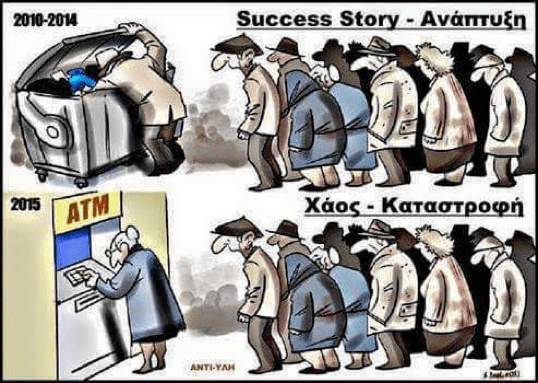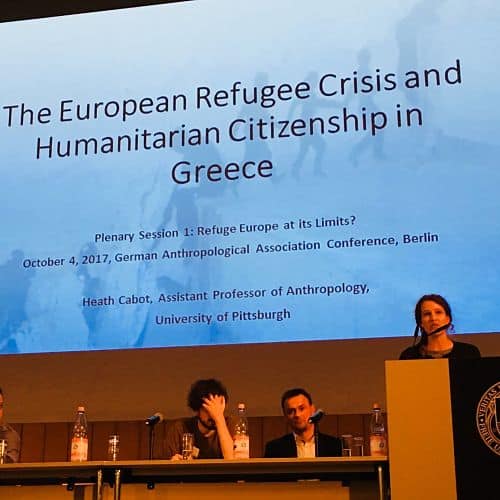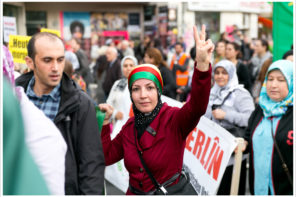My introduction to the German Anthropological Association was from the podium of the Opening Plenary Panel in the Audimax of the Freie Universität Berlin, looking out at what I imagined was a sea of austere faces waiting for me to fail. I was one of two explicit “outsiders” on the panel, along with Alessandro Monsutti (a bit of a hero of mine), who had flown in just that day from Switzerland for the occasion. Alongside the third panelist, Žiga Podgornik-Jakil (himself an insider/outsider, an anthropologist from Slovenia doing his PhD at the Freie Universität, and his fieldwork in Berlin), we were to respond to the provocation that Olaf Zenker, the panel organizer, had set out: “Refuge Europe at its Limits?” Monsutti would speak about Afghans on the move in Europe, framing their mobility as a political act; Podgornik-Jakil on the topic of protests at a Berlin emergency shelter for refugees. I was going to talk about how austerity in Greece has positioned many Greeks and refugees on the same precarity continuum. The topic was political and politicized, and it promised to be a provocative discussion. Thus began my appearance as an American interloper at the German Anthropological Association conference.
Let me be clear: my networks with European academics are crucial to my professional life, and I prioritize these collaborations. I am actually a naturalized Italian citizen, and I consider my chosen Europeanness to be a central aspect of my identity (I was most pleased when Monsutti asked me if my real name was Caboto, as in Giovanni. It is not. Cabot is a French-Anglo surname, which is as “WASPy” as they come. I am Italian only thanks to marriage). But almost all of my time in Europe is spent in the South: in Italy, where I have family, friends, and valued colleagues; and of course, in my fieldsite of Greece, which has become a second home to me, with many of my closest friendships and most valued professional networks. And if I am truly honest, having not been to Germany since the imposition of austerity in Greece, I was carrying a bit of a chip on my shoulder. It’s hard not to imbibe some of the, most justified, bitterness that many in Greece now express toward this rich country of the North (though not often personally toward Germans). And so I even had a picture of Schäuble colonizing the Acropolis on my power point, which I kind of hoped would offend someone just a little (especially a progressive anthropologist).

Thoughts of Wolfgang Schäuble (translated): “Should I turn it into a country house or rent it out to tourists? Where should I build the pool?” (July 2015)
Before the plenary session, I had spent two days at a fabulous socio-legal studies workshop at Humboldt University, and had been slightly unsettled by the direct and perhaps even confrontational style of some more senior German academics. Having voiced my nervousness to some supportive German colleagues, I was told not to worry: confrontational questions mean that there is intellectual traction and interest. The worst possible scenario, said a new friend, is if people do not engage at all. This did little to assuage my nerves, though, and even Monsutti began his talk with a charming little aside about being intimidated.
Fast-forward through the whirlwinds of the papers to our discussion.
I was not to be disappointed. Sarah Green began with a challenging but generous question about how to analyze experiences of displacement and precarity without producing the very discourses one hopes to critique. The next two interventions, though, set the tone for the rest of the Q and A, which even my German colleagues would later characterize as “provocative.” Both highlighted a certain one sidedness of the panel and the overarching message as being overly focused on “the underdogs”. Carola Lentz from the University of Mainz “provocatively” noted that she thought we had all indulged a bit in “moral high ground”, and raised the point that it surely would be useful to also study bureaucrats or decision-makers in their encounters with migrants. (A point that, as an American, I couldn’t help but read as an invocation of Laura Nader’s well-established call to “study up,” though it actually referenced their work in Mainz on studying the state). The point was well taken, although Zenker had addressed it, in part, in his closing statements, highlighting that while all such perspectives are important, with limited space and time he had chosen to foreground work on refugees and activists. Thomas Bierschenk, also from the University of Mainz, made a comment that found its way onto Allegra’s rolling twitter feed as “provocative,” and had real staying power in the conversations I had over the next few days. He noted that the refugee crisis seems to have been a bit of a “windfall” for anthropologists. And furthermore, we were all speaking “for” refugees — but can’t the subaltern speak for themselves? My response was yes, and yes (I had actually written about this).
But the point hit home more than I cared to admit at the time. After all, I was speaking about asylum at this opening plenary largely thanks to the “refugee crisis.”
And so, great: I’d had twenty minutes to introduce myself and my work to 300 or so German anthropologists—and I had probably just failed.
But after a while, as the discussion went on (and on), I relaxed. I was free. This was an opportunity to field questions from people who had listened and were now engaging critically. The tension eased with some nervous laughs when migration scholar Heike Drotbohm (as a consolation: also from the University of Mainz) gently reprimanded her colleagues for traumatizing the foreigners. A jovial American accent on a smiling bearded face from the back of the room entered the discussion in the figure of legal and linguistic anthropologist Justin Richland, asking at the top of his lungs—foregoing the mic—about how we distinguished between morality and justice.
In my view, in hindsight, the most truly provocative question was Christopher Hann’s which he “gently” put forward: whether there was any merit to his Hungarian interlocutors’ assertions that everyone has the right to flourish in “one’s native land.” The implications were perhaps too uncomfortable to be sufficiently engaged with, even by this “provocative” group of anthropologists.

Comic making the rounds on Social Media, June 2015: “Success story – Growth” | “Chaos – catastrophe”
Later, the public contest having fizzled out, I was exposed to rounds of niceties over wine and finger food, and was graciously greeted and thanked for my talk. I exchanged sincere sentiments of appreciation with people whose work I had only known from afar. Sure, predictably (for a still-junior woman scholar), my presentation was not always noted for its substance but as “enthusiastic” and “lively.” My “youth” was noted a couple of times. (Such well-intended paternalism is dominant everywhere). But overall, I was pleasantly surprised at the generosity and friendliness of these conversations. I went seeking out the angry-seeming folks from the University of Mainz who, to my surprise, were smiling over their wine. One person noted, quite sagely I think, that this “confrontational style” is really about the premise that “there is always room for improvement.”
Good point!
I also received some useful direct advice, which may or may not be representative of “German academic culture” as a whole but was presented to me as such: that in Northern Europe it’s not seen as very attractive to show a slide of one’s book, as I had done – that it is too much self-promotion. But that I was forgiven since people know I was from the US. (And indeed, Ulla Berg from Rutgers, showed a slide of her book during her lovely talk at the closing plenary a couple of days later. I have always been told by mentors that I am “my own best advocate.” Perhaps not in Germany!).
Noted!
I sought out Bierschenk a couple of days later for a longer conversation, and he thanked me for taking up his challenge, so to speak, and we had a lively exchange about the meaning of anthropology, the role of the political, and how to study the state. I’m still thinking about his comments.
Having gotten my big talk out of the way, I was left to relax and try out my conferencing style on the German anthropologists. To get through the social tension and exhaustion of professional conferences, I tend to employ a mix of formal interaction and ice breakers to cultivate rapport – mostly jokes and slightly unexpected comments. Here I was forced to adapt. In private and public interactions, direct questions and comments I made were received with generosity, and sincere new collegial relationships were formed. What didn’t work so well were my attempts at generating a kind of “cultural intimacy” (Herzfeld 1997) with my new German friends which, as a reminder, is “the recognition of those aspects of a cultural identity that are considered a source of external embarrassment but that nevertheless provide insiders with their assurance of common sociality.” In hindsight my lack of success is no surprise; I was not an insider, and I do not speak German. So my occasional quips about German time and formality were not dignified with a response, and I started to wonder if maybe they really weren’t all that funny. (Still, do Germans joke about punctuality among each other?) On the plus side, although some laughed when I myself made sassy asides about my Americanness, not once did anyone throw it in my face (which my Greek and Italian colleagues often do, though always in the form of a joke or something to laugh at—jokes being, in the South at least, particularly devastating venues for social commentary).
Overall, I realized that I may have spent a bit too much time only in the European South, where commentary (both romantic and derogatory) about the North is par for the course; and where stereotypes around “culture” are crucial idioms for negotiating hierarchies and establishing rapport. My few days with the German anthropologists exposed me to another kind of warmth, though: which seems to emphasize saying what one means, in public and in private; and a new version of hospitality than that to which I am most accustomed, which seemed to be grounded on sincerely offering what one intends, no more and no less. More than once I was relieved not to have to engage in a ritual end-of-dinner fight over the bill.
As an outsider, I also did not have sufficient insight into the stakes of the contested discussion which ended in the name change of the association from the study of Völkerkunde to the perhaps more Anglicized but also more contemporary Sozial- und Kulturanthropologie (the more continental Ethnologie was also a contender). Still, I had many discussions which highlighted the merits of all sides. My closer colleagues (in age and political orientation) supported the name change, in part as a departure from what many found to be disconcertingly nationalist implications embedded in the notion of the Volk (of separate and discreet peoples), as well as the term’s current use by people on the political right. But I also heard the important argument in favor of highlighting anthropology’s German roots rather than, as one new friend put it, submitting to the “cultural imperialism” of an Anglo-American tradition. And of course, I couldn’t possibly forget my encounter with the gregarious and charming Flemish expert on German anthropology, Han Vermeulen, the champion of Völkerkunde, whom I met in the courtyard of the building as he (and his cigarette) were almost blown away by the impending (literal) storm Xavier.
I also learned some important lessons from inhabiting, if just briefly, a “public” anthropology role in a place where, to be frank, many might be justified in thinking I have little business doing so. Even if I do believe reflexive participation in public engagement of diverse kinds is appropriate for anthropologists working on topics of urgent current import. I did a short interview with Der Spiegel Online, and was pleased to learn that our opening plenary was covered in the press. The interest was a testament to Zenker’s decision to frame a topic in a manner that may not have pleased everyone but which built a message and gave it scope. And I believe
our panel consensus was that Refuge Europe is at its limits. That is certainly the message that I would deliver, based on my research in Greece.
And yet this too demands a new kind of reflexivity, to avoid that annoying “moral high ground” (thank you again, Professor Dr. Lentz) which I myself find so problematic in many anthropological public interventions. In Greece, as a foreigner doing research on politically charged issues, I always caution visitors from getting into political debates before learning the local context. And Greece is overflowing with interlopers – not just with anthropologists like myself, but also with humanitarian actors (including many German NGOs) as well as voluntourists and professional anarchist types from the European North (again, often Germans). There is also a thriving community of expat artists (many Germans) who find Athens vibrant, livable, and “cheap.” Athens, my Greek friends have joked, is becoming a bit the “new Berlin”: hip, affordable (if you are not Greek, that is), and where you don’t have to learn the local language since “everyone speaks English” (not unlike both German and Greek anthropologists). The parallels are accumulating, across the North and the South.
I have been up on my high horse about these interlopers parachuting into Greece for the past number of years – certainly since the imposition of austerity. But this time, I ironically found myself speaking to a room full of (then unfamiliar) faces about refuge in Europe – the American speaking about the Greeks to the Germans. And as I watched my Der Spiegel interview circulate on Twitter, I was gratified for the platform, and I still do believe in the message – but I cringed a little at the headline: “American migration expert says that the EU countries missed a chance.” The moralizing tone, from the “expert” on migration, coming all the way from the land of Trump to call out the Germans on how they treat the refugees and the Greeks.
My new German friends probably won’t find that funny. Probably because it isn’t.
I can hardly wait for the next conference of the re-christened DGSKA, to be convened in Konstanz in 2019.
Reference
Herzfeld, Michael. 1997. Cultural Intimacy: Social Poetics in the Nation State. Oxford and Providence: Berg.







Definitely some interesting observations, Heath. As a German native with academic socialization in the UK, Canada and Sweden, I’m usually OK with a little bit of self-promotion ;)! I conducted ethnographic research within the German peace research community a few years ago in case anyone is interesting in exploring and comparing further:
“From Social Movement to Ritualized Conference Spaces: The Evolution of Peace Research Professionalism in Germany” (link to summary, open access pre-print and paywalled version in Peace & Change:
http://aidnography.blogspot.se/2016/06/from-social-movement-to-ritualized-conference-spaces-peace-research-professionalism-Germany-Denskus-Peace-Change.html)